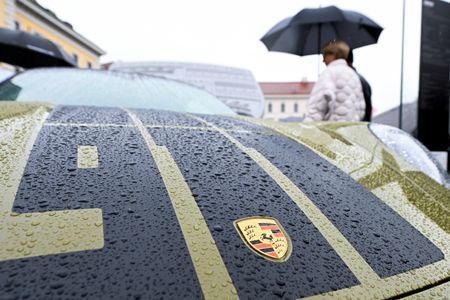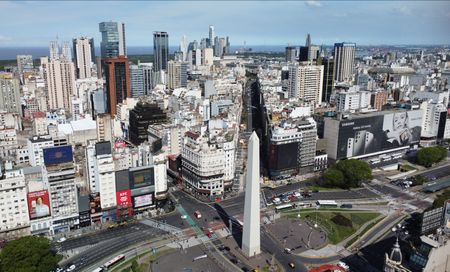By SimonFerdinand Eibach and Rachel More
BERLIN (Reuters) -Investors punished German sports car brand Porsche on Monday after the firm, caught between its iconic gas guzzlers and a shift to electric vehicles, warned that its profits this year would be hurt by delays in its EV roll-out.
Porsche’s shares slumped over 7% on Monday after it dialled back the EV roll-out and cut profit margin guidance on Friday due to weaker demand, pressure in key market China and higher U.S. tariffs.
The carmaker’s woes point to a wider challenge as peers in the European sector look to navigate the global EV shift, as fierce price wars and an economic slowdown in China erodes demand, especially for higher-end brands like Porsche.
Parent firm Volkswagen, Europe’s top carmaker, said it would take a 5.1 billion euro ($6 billion) hit from the product overhaul, which would delay some EV models in favour of hybrids and combustion engine cars. The delays will slash Porsche’s operating profit by up to 1.8 billion euros this year.
Volkswagen shares were also down 7.5%, on track for its biggest slide since 2023.
PORSCHE’S PROFITABILITY TARGET SHRINKS WITH EV DEMAND
Porsche now expects its 2025 profit margin to be no more than 2%, down from a previously guided range of 5% to 7%.
Some analysts saw the guidance cut as inevitable given pressure on Porsche to extend the life of its combustion engines due to sluggish demand for EVs.
A 2035 ban on sales of new combustion engine cars is looming in the European Union although auto executives have urged Brussels to relax that goal, arguing it is no longer feasible.
Porsche has said it expects the realignment to have a positive impact in the medium- to long-term, targeting a medium-term operating return on sales of 10-15%, after 18% in 2023 and 14% in 2024.
At the time of its listing three years ago, the company had sought a return on sales of over 20% in the long term.
Since then, Porsche shares have lost almost half their value, with analysts at Bernstein noting that billions of euros in investment in the shift to EVs had not resulted in a credible challenger to top players like Tesla.
“It will take time and money to reset the product programme to provide the flexibility and drive-train choices that its customers are demanding,” Bernstein said in a note to investors.
CORRECTING THE ‘MISTAKE’ OF OVERDEPENDENCE ON EVS
Volkswagen, which owns 75.4% of Porsche, cut its profit margin outlook to 2% to 3%, from 4% to 5% previously.
Jefferies analysts said the revision of Porsche’s outlook – the third so far this year – may be the last but warned that it could bring product cycle and brand challenges.
With much of Porsche’s 1.8-billion-euro charge likely in the third quarter, the analysts said they expected a loss in the second half.
One local stock trader said that the strategic decision was “inevitable” and warned the company had become too dependent on electric vehicles.
“The correction of the former mistake to become too dependent on EVs will take time,” said the trader, talking on condition of anonymity.
Problems at Porsche and Volkswagen have fuelled calls from shareholders and unions for Oliver Blume to end his dual role as CEO of both companies.
($1 = 0.8501 euros)
(Writing by Rachel More; Editing by Miranda Murray and Bernadette Baum)










